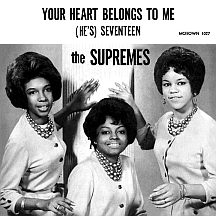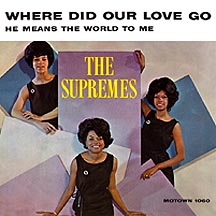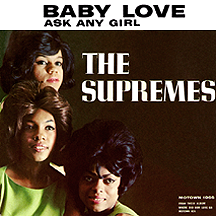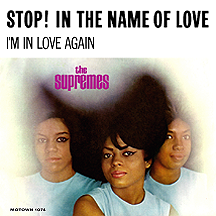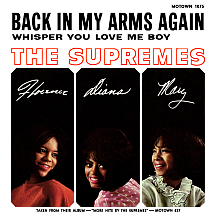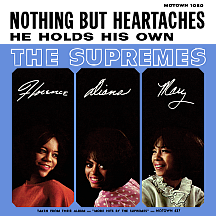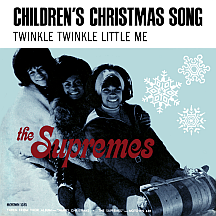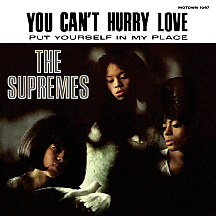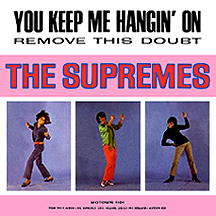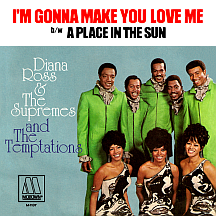THE SUPREMES
The designated second- and third-banana members of The Supremes, the leading American music group of the 1960s, both have loyal, unwavering fans. Florence Ballard, in particular, has had staunch supporters all along. The unofficial leader of the group in its early years, she was arguably the best choice for lead singer. Mary Wilson holds more of a "what if?" position, as she was given limited opportunity to rise beyond the background. Still, everyone loves her. There are arguments for and against the anointment of Diana Ross to the central role of what became so much more than a lead vocalist. When she went solo in 1970, a wave of negativism swept through the worldwide community of Motown fans; people actually wanted her to fail! Some have blamed her for killing the group (they actually had a solid run of hits without her), for allegedly stepping over the other two on her way past the top and into the stratosphere.
But let's lay the credit (not blame) where it belongs, with the calculatingly astute leader of the Detroit dynasty called Hitsville, U.S.A., Berry Gordy, Jr., who identified in Diana the poise, personality and charisma that might connect on a large scale and make the Supremes a household name. It sure wasn't obvious when the original four-girl group started hanging around the Hitsville house during their senior year in high school. Once he started recording them, it took three full years before they caught a break; any other record label would have dropped the act within the first few failed releases, including Gordy, who did just that with some of his early hopefuls. But...he admitted years later that he'd fallen in love with Diana during that time (she was a teenager; he was in his early thirties...and married), a fact that was gossiped about by many around him. If it clouded his judgment, so be it; he was determined to make stars of the Supremes and see the apple of his eye elevated to a level of success he was certain she could reach. If not for his resolve, the act might have ended up a mere footnote in music history. Nevertheless, he nearly always intended to keep Flo and Mary in the background, in spite of their rightful places up front on either side.
Evolving separately: In the spring of 1959, about the time Gordy began writing and producing hits for Marv Johnson, the girls, unknown to him, called themselves The Primettes and functioned, wisplike, as a "sister" act to The Primes (one of two groups that later merged into Motown's sensational Temptations), also off Gordy's radar. Mary and Florence, both about 15, had become school chums and Diane Ross was a passing friend who'd moved into the neighborhood several months earlier. Birmingham, Alabama-born Milton Jenkins managed the Primes, each a few years older than the girls; member Paul Williams was going with Betty McGlown and she joined Flo, Mary and Diane (because a trio would be unthinkable, what with all the popular four- and five-member girl groups like The Bobbettes, Chantels and Shirelles). After some practice they were deemed adequate, so Jenkins set up a few singing gigs at local dances and parties...for no pay, of course!
Guitarist Marv Tarplin had an unassuming personality and a dynamic way of playing; he began accompanying the quartet on a regular basis. In July 1960 they won first prize in an amateur competition held across the river in Windsor, Ontario and decided it was time to audition for the recently-established Motown. At the house on Grand Avenue they first sang for Smokey Robinson, who showed more interest in Tarplin and ultimately "stole" him away. He worked permanently with The Miracles starting then and there. An appointment was set with the boss; Flo, Mary, Diane and Betty sang The Drifters' hit "There Goes My Baby" for Berry, along with a couple of other songs, and he gave this advice to the schoolgirls: "Come back after graduation." With their eight feet in the door, though, they began hanging out on a regular basis, determined to get their shot.
True love stepped in: Betty left the group to get married and the others continued as a trio before adding Barbara Martin. Nothing seemed to be happening at Motown, so they took a different approach, recording two songs with local music producer Richard Morris in a makeshift basement in Detroit; "Tears of Sorrow" (a tune similar to "There Goes My Baby") and "Pretty Baby" were set aside and finally released on the Lu Pine label a couple of years later. Gordy was more receptive when they returned to Motown to try their luck again; the Primettes made their first Motown recordings in December 1960. The following month, while still in school, they were signed to a contract on the condition they come up with a new name; Berry liked Flo's suggestion, The Supremes (overlooking the fact it had already been used by at least a few male vocal groups). He also changed Diane's first name to Diana, which he considered more glamorous. "I Want a Guy," a Gordy-Brian Holland-Freddie Gorman ballad with Diana's lead vocal, was issued on Tamla in February 1961.
Berry believed in the potential of his new act...and kept believing through almost three years of failed efforts. Florence sang lead on the second Tamla single, "Buttered Popcorn" (penned by Gordy and promotion man Barney Ales), after which the Supremes had to keep their egos in check while they stood by and watched a new Tamla signee, The Marvelettes, go all the way that fall with the company's first-ever chart-topper, "Please Mr. Postman." Barbara, meanwhile, also headed to the altar, but stayed with the group. The girls were put through their paces in the company's infamous "artist development" department (the "charm school" end of Hitsville), staffed by many of the same women who chaperoned the female acts on tour as well as men like Maurice King, who taught music classes and vocal coaching, and Cholly Atkins, the experienced choreographer behind the stage moves the label's acts became known for. At some point in 1962, Barbara departed and wasn't replaced.
First chart single: "Your Heart Belongs to Me," a Smokey ballad, marked the Supremes' Motown label debut and, more importantly, the designation of Diana as lead singer...on every A side for the remainder of the decade. WJLB disc jockey Ernie Durham did his part to get the single heard on any radio within a hundred miles of Lake St. Clair; it managed to log a few weeks on the national charts in August 1962. Berry's uptempo "Let Me Go the Right Way" and Clarence Paul's "My Heart Can't Take it No More" (steel guitar on a Motown record!) also made brief appearances on the national charts, doing little to help their cause but at least making it easier in terms of booking performance gigs in the area, their only source of income so far. A teasingly cruel nickname, "The No-Hit Supremes," made the rounds at the house on Grand; everyone was laughing except the three butts of the joke. Other acts, more mature and experienced in many cases (Henry Lumpkin, Little Iva, Mickey Woods, The Satintones), also went hitless yet avoided this kind of social torment. An improvement in the group's fortunes was not immediately forthcoming.
One song by Smokey had the longest title in Motown history: "A Breath Taking, First Sight Soul Shaking, One Night Love Making, Next Day Heart Breaking Guy," its title revealing the entire story. Shortened to "A Breath Taking Guy," it rose slightly higher than its predecessors while remaining in Billboard's nether region. Gordy stuck to his personal pledge to get them a hit. The problem-solvers were right there under his nose. Lamont Dozier sang with Detroit group The Romeos during his teens (they had two singles in 1957 on the local Fox label and N.Y.'s Atco Records). Brian Holland had been half of the "Brianbert" team responsible for the Marvelettes' breakthrough hit. The two worked with Freddie Gorman before he dropped out and was replaced by Brian's older brother Eddie Holland, who'd made records with Gordy as early as 1958 and had just scored one of Motown's early hits, "Jamie." Their first effort together, "Dearest One," was recorded by Dozier for the Mel-o-dy label in mid-'62. In '63 the Holland-Dozier-Holland team produced and/or composed hits for the Marvelettes, the Miracles, Mary Wells and Martha and the Vandellas (the group's scorching "Heat Wave" stands as one of their shining moments).
Fall 1963: Holland, Dozier and Holland took their first shot with the Supremes...and finally the girls had a hit! "When the Lovelight Starts Shining Through His Eyes" went top 40 in December and climbed as high as number two on the R&B charts. Diana, by most accounts, was soft-spoken and humble those first few years, but would soon do a fairly rapid 180 when all the adoration kicked her ego into gear. "Lovelight" was followed by "Run, Run, Run," a comparable failure. Gordy doubted H-D-H's ability to guide the former "No-Hit Supremes" to any kind of sustained success. "Where Did Our Love Go," with its footstomps and 'baby, baby's didn't sound like a hit to most Motown insiders; the Marvelettes rejected it and the Supremes griped about taking their leftovers. Dick Clark, in putting his 1964 Caravan of Stars tour together, was very interested in Brenda Holloway, whose Motown hit "Every Little Bit Hurts" hadn't even been recorded in Detroit. Gordy insisted he take the Supremes too (which was no problem, since they had the one hit to their credit).
One hot summer: The exact moment their lives changed was not entirely obvious to the trio, but they knew something was up during the tour when applause got louder and more intense with each passing night. "Where Did Our Love Go" had caught fire, rising quickly into the number one spot in August of '64, though for a time, consumed by the demanding routine of going to a new city every day, the Supremes were unaware of what was happening. With stars like Gene Pitney, Major Lance, Brian Hyland and much greater-than-they girl groups like the Shirelles and Dixie Cups, plus close to a dozen other acts on the bill, the feeling must have been surreal at the point where the group started closing each show. "Worst to first" in less than a year? Suddenly they were Motown's hottest act!
Hit after hit: Back at home that fall, "Baby Love" shot to number one (a few months later it was Grammy-nominated in the category Best Rhythm and Blues Recording, ultimately losing to "(You Don't Know) How Glad I Am" by Nancy Wilson). The release date of "Come See About Me" was moved up when a cover by Wand artist Nella Dodds popped up. For two weeks in December, their "Baby Love" and "Come See" singles were in the top ten together before the latter became the third consecutive number one. No Motown artist had ever done anything like this! As '65 got under way, the top TV shows scrambled to book them (Ed Sullivan led the pack). The trio appeared wearing fancier dresses and wigs, looking far more stunning than they had just a year earlier. H-D-H often used pop culture phrases for the titles and lyrics of their songs; cop cliché "Stop in the name of the law!" served as inspiration for the group's fourth number one hit in a row. The arm-extension move used for "Stop! In the Name of Love" became famous (another Grammy nom, this time in the category Best Contemporary Rock and Roll Performance by a Group, led to a curious loss to "Flowers on the Wall" by country quartet The Statler Brothers).
Diana, well aware of the effect she'd had on poor, smitten Berry, took advantage by frequently voicing her opinions and standing up to him; he usually got his way...or did he? A European tour began in March 1965, at which time the Motown head man and his muse started an ongoing affair during a stop in Paris. More H-D-H magic: "Back in My Arms Again" became the fifth straight number one hit in June. One goal of Gordy's was to get his artists into the top nightclubs; on July 29, the Supremes headlined New York's Copacabana. If any doubt existed as to who the real star was, Diana made it more clear as time went by. The soft chart run of the next single, "Nothing But Heartaches" (it just missed the top ten despite being every bit as good as the previous singles), didn't shake Dozier and the Holland brothers; they bounced back with a song The Isley Brothers had just unsuccessfully recorded for V.I.P., "I Hear a Symphony," the Supremes' sixth number one. These singing fashionistas, barely in their twenties, weren't just Detroit's, but the entire U.S.A.'s answer to Britain's Beatles (ten number ones as of late '65) who, looking in their rear-view mirrors, kept seeing those ladies from Michigan nipping at their heels!
Holland, Dozier and Holland worked overtime to create the best material for the group, now at the forefront of all Motown attractions. The poignant "My World is Empty Without You" led off '66, followed by "Love is Like an Itching in My Heart," the cautiously hopeful "You Can't Hurry Love," the group's seventh chart-toppper, and 'Set me free...' smash "You Keep Me Hangin' On," number one hit number eight. The pressure of being under the microscope was destructive to Florence; she began drinking heavily and became increasingly difficult to be around. While Mary adapted to the gradual elevation of Diana to group leader, Flo took issue and even left the group temporarily. In April 1967, Cindy Birdsong (a member of Patti LaBelle's group The Bluebelles) stood in for her at a live show at the Hollywood Bowl. Flo returned shortly afterwards.
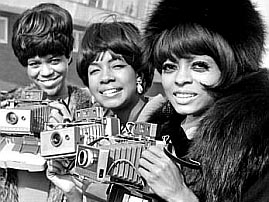
One of her specialties: "Love is Here and Now You're Gone," featuring spoken-word lines emotionally delivered by Diana, was the ninth single to reach number one in March 1967. The tenth followed immediately in the form of a movie theme, "The Happening" (a groovy kidnap caper starring Anthony Quinn and emerging star Faye Dunaway); H-D-H supplied lyrics for composer Frank DeVol's theme, making the song unique among their body of work. Florence was finally fired from the group in July after arriving intoxicated for a live show. With her lawyer present, she was officially dismissed shortly afterwards and Cindy was brought on as her permanent successor.
The name game: As Motown grew, certain personalities stood out from the groups they were in. The Miracles became Smokey Robinson and the Miracles (a development long in the making, as the label of their 1961 hit "Shop Around" had included the line "featuring Bill 'Smokey' Robinson") and Martha's last name was added to the company's runner-up girl group, Martha Reeves and the Vandellas. The controversial switch to Diana Ross and the Supremes coincided with Gordy's dismissal of Ballard; H-D-H's outer-space-effects-spattered "Reflections," the last single to feature a backing vocal by Flo, peaked at number two in September (Bobbie Gentry's "Ode to Billie Joe" the buzz-worthy hit that blocked it from the top spot). "In and Out of Love" followed it into the top ten near the end of the year. Diana, Mary and Cindy made their acting debuts together, playing nuns in a January 1968 episode of the NBC-TV series Tarzan starring Ron Ely.
The Motown family started breaking up as the '60s came closer to its end; Holland, Dozier and Holland, feeling they deserved more control over their fates, departed Motown and founded the Hot Wax and Invictus labels. Within a year they were producing a number of hitmaking acts, including The Honey Cone, The Flaming Ember, Glass House, 100 Proof Aged in Soul, Freda Payne and Chairmen of the Board, each with at least one major hit over the next two or three years. "Forever Came Today" (sci-fi effects with a theremin sound!) was the final single written and produced by the three-man phenom responsible for the most spectacular run of hits for any act in Motown history. Florence signed with ABC Records and her first single appeared in the spring of '68; "It Doesn't Matter How I Say It (It's What I Say That Matters)," a production not unlike something she would have done for Motown (though I'd say it's her voice that makes it sound that way), failed to catch on. A second single, "Love Ain't Love," credited to Florence "Flo" Ballard, was released in the fall; penned by Van McCoy, it was a more forward-thinking, non-Motownesque production, but only a few scattered radio stations showed interest.
The Supremes, meanwhile, had problems of their own reaching previous chart heights; for a time it seemed they were lost without the songwriting genius of H-D-H. Nick Ashford and Valerie Simpson's "Some Things You Never Get Used To" was considered a "dud"...an unfair assessment of a good song, though it wasn't a particularly big hit. A different approach was taken as the "message song" trend (led by the Temptations with "Cloud Nine") took off in the fall of '68. Pam Sawyer, R. Dean Taylor, Frank Wilson and Deke Richards collaborated under the name "The Clan" and came up with "Love Child," a no-punches-pulled inner-city narrative ('Started my life...in an old, cold run down tenement slum...my father left, he never even married mom...I shared the guilt my mama knew...'), an about-face from all earlier Supremes works...and it was a smash, the group's eleventh number one hit (and first with Cindy).
This chart-topping triumph coincided with the group's first televised special, the top-rated TCB (Takin' Care of Business), which also starred the Temptations, broadcast on NBC December 9, 1968. The soundtrack album hit number one two months later and a single, "I'm Gonna Make You Love Me," peaked at number two. Then came a hodgepodge of hits: "I'm Livin' in Shame," another Clan track thematically similar to "Love Child," Smokey Robinson's "The Composer" and Gordy and Hank Cosby's "No Matter What Sign You Are," alternating with Supremes and Tempts singles "I'll Try Something New" (the seven-year-old Miracles classic) and "The Weight" (a more recent song established by Jaime Robbie Robertson's band The Band). The writing was on the wall by that time. The Supremes were breaking up? Possibly not, but one thing had been preordained: Diana was leaving for a solo career.
Back to the tube: Following the huge success of TCB, another variety special was taped and placed on the NBC schedule: G.I.T. (Gettin' it Together) On Broadway aired on November 12, 1969 with the same billing order: Diana Ross...and the Supremes...and the Temptations. Then on December 2, shortly before the curtain went down on the Ross-era Supremes, Cindy Birdsong was kidnapped! A maintenance worker at Cindy's apartment building forced her into his car at knifepoint, but she was able to jump out of the car unharmed; the man was later arrested. Whew...Mary Wilson came close to being the only Supreme left standing. She and Cindy, by the way, weren't even present for the recording of Diana's "farewell" single, "Someday We'll Be Together," written by Johnny Bristol and Jackey Beavers. They'd recorded it in 1961 for the Tri Phi label as Johnny and Jackey (Bristol also sang on the Supremes' version). It became something of a media event in December and...surprise...hit number one (that's 12 total for anyone who's counting), as dazzling an end to a decade as any. At that point in time, the Supremes trailed just six behind the mighty Beatles' 18 chart-toppers. The decades's second-biggest music group by far, they were also the most successful of all girl groups, a distinction that still stands.
January 1970: Their actual farewell performance happened at the Frontier Hotel in Las Vegas on the evening of January 14. The three were joined by Diana's replacement, Jean Terrell (boxer Ernie Terrell's sister). The new trio was welcomed by fans and enjoyed a nice run of hits in the first third of the decade; in 1970 alone they hit big with "Up the Ladder to the Roof," "Everybody's Got the Right to Love" and "Stoned Love." Jean and Cindy both left the group after a few years, though Cindy returned, ultimately staying with the act for most of its remaining time. Later members include Lynda Laurence, Scherrie Payne (H-D-H bombshell Freda's sister) and Susaye Greene. The underrated Mary Wilson was a trooper and perhaps deserves the highest accolades of all; she was there from the beginning to the end. The Supremes broke up in 1977.
Diana kicked off her iffy (not for long) solo venture with "Reach Out and Touch (Somebody's Hand)," then reworked the Marvin Gaye/Tammi Terrell hit "Ain't No Mountain High Enough" into an epic spoken-and-sung number one smash. Berry Gordy's early-on hunch about her was right on the money. Clouded though his judgment may have been due to his feelings for her, he was nonetheless correct in his initial belief that she possessed the "special something" it took to be a major star. There were many more hit singles and a high-profile entrance into movie stardom with Lady Sings the Blues, the well-received film telling the life story of Billie Holiday, with a performance by Diana as "Lady Day," so good it's hard to believe, that landed her an Oscar nomination for Best Actress and Golden Globe win for Most Promising Newcomer, Female. Diana Ross remained at the forefront of the music industry through the mid-1980s.
The one downside: By the mid-'70s, Florence Ballard was living in poverty, supporting her three children with monthly welfare checks. It's one of the devastating tragedies of music history; her heart gave out and she died in February 1976 at just 32 years of age. Every so often someone will insensitively voice an opinion that Diana climbed over Flo's back to reach the top, or something to that effect. But that wasn't the case; Florence, a beloved figure to many, just couldn't handle the rigors of stardom. Betty and Barbara got out early. Mary was up for it. Diana thrived on it. Each of the group's members handled the situation in her own way.
NOTABLE SINGLES:
- I Want a Guy - 1961
- Buttered Popcorn - 1961
- Tears of Sorrow - 1962
as the Primettes - Your Heart Belongs to Me - 1962
- Let Me Go the Right Way - 1962
- My Heart Can't Take it No More - 1963
- A Breath Taking Guy - 1963
- When the Lovelight Starts Shining Through His Eyes - 1963
- Run, Run, Run - 1964
- Where Did Our Love Go - 1964
- Baby Love /
Ask Any Girl - 1964 - Come See About Me - 1964
- Stop! In the Name of Love - 1965
- Back in My Arms Again - 1965
- Nothing But Heartaches - 1965
- I Hear a Symphony - 1965
- Children's Christmas Song /
Twinkle Twinkle Little Me - 1965 - My World is Empty Without You - 1966
- Love is Like an Itching in My Heart - 1966
- You Can't Hurry Love - 1966
- You Keep Me Hangin' On - 1966
- Love is Here and Now You're Gone - 1967
- The Happening - 1967
- Reflections - 1967
as Diana Ross and the Supremes - In and Out of Love - 1967
as Diana Ross and the Supremes - Forever Came Today - 1968
as Diana Ross and the Supremes - It Doesn't Matter How I Say It (It's What I Say That Matters) - 1968
by Florence Ballard - Some Things You Never Get Used To - 1968
as Diana Ross and the Supremes - Love Child - 1968
as Diana Ross and the Supremes - Love Ain't Love - 1968
by Florence "Flo" Ballard - I'm Gonna Make You Love Me - 1969
by Diana Ross and the Supremes and the Temptations - I'm Livin' in Shame - 1969
as Diana Ross and the Supremes - I'll Try Something New - 1969
by Diana Ross and the Supremes and the Temptations - The Composer - 1969
as Diana Ross and the Supremes - No Matter What Sign You Are - 1969
as Diana Ross and the Supremes /
The Young Folks - 1969
as Diana Ross and the Supremes - The Weight - 1969
by Diana Ross and the Supremes and the Temptations - Someday We'll Be Together - 1969
as Diana Ross and the Supremes - Up the Ladder to the Roof - 1970
- Everybody's Got the Right to Love - 1970
- Stoned Love - 1970
- River Deep - Mountain High - 1971
by the Supremes and Four Tops - Nathan Jones - 1971
- Floy Joy - 1972
- Automatically Sunshine - 1972
- Your Wonderful, Sweet Sweet Love - 1972
- I'm Gonna Let My Heart Do the Walking - 1976


